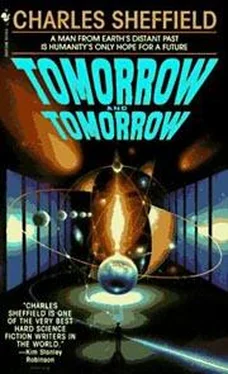“Intelligence of a sort. Sometimes if an idea is old enough, it can seem brand new. I ought to have known what was going on ages ago, as soon as you told me that there were two distinct types of signals coming from this galaxy, and that you were unable to interpret either of them. You said that any signal at all should be intelligible to you. But suppose it was designed not to be understood by anyone without a suitable key? Suppose both sides were employing ciphers, codes that the other could not break.”
“Intentional obscurity. That is certainly possible. But what makes you so sure that the galaxy is dead? How can that be true, and the technology still be working?”
Drake realized that he could explain even that. His mind had thrown at him an image of a long-ago performance of Haydn’s Farewell Symphony, of a conductor facing a group of players. In front of each stood a lighted candle. One by one, each musician finished his or her own orchestral part, snuffed out the candle, and left the stage. Finally the whole orchestra was gone. The conductor stood alone in darkness.
The ship was unlikely to benefit much from that thought. “Let me tell you what happened on Earth,” Drake said, “in the years just after I was born. Two great powers had been busy building up their nuclear weapons. The chance of all-out war seemed very high. That war, if it happened, would be short. A couple of hours and it would be all over. Missiles over the pole could be launched to reach any target within thirty minutes. The military on one side — our side, people would say, though I never thought of it as my side — decided that they must keep some kind of communications system working, even after the main war was over. They imagined a space-based command post, a whole constellation of special satellites in orbit around the Earth. The spacecraft would be completely operated by computers, and they would form a kind of central nervous system for all fighting, no matter when it happened. The system was called MILSTAR, for Military Strategic, Tactical, and Relay system, and it was supposed to be able to function even after the main spasm of war was over. The military planners didn’t intend for MILSTAR to help with civilian reconstruction. That wasn’t its job. They wanted it to handle military communications — and to be able to support fighting again, if necessary, months or years later. They wanted MIL-STAR ready to fight another war. It was designed to function even if all the surface command structures had been obliterated. It was supposed to be able to call on robot weaponry, whether or not there were humans around.”
The image came again. The conductor stood facing a full complement of players. As the military .powers on land, sea, and air were snuffed out by enemy action, MILSTAR continued, organizing and optimizing resources that became smaller every second. Finally, the stage held nothing but orchestral desks and empty instrument cases. The conductor waved his baton over a vanished army of players. MILSTAR floated serenely on through space, its communications system in full working order and ready to shape a second symphony of Armageddon.
“The MILSTAR satellites had to be very sophisticated. They needed a long operating lifetime. They had to be mobile, to avoid direct missile attack; durable, to operate for years without a single human mind to direct them; robust, to survive electromagnetic pulse effects and near misses; and smart, able to talk easily to each other using a variety of encrypted signals, so that the enemy could never crack the global communications network.
“It was a highly secret project. It had to be. That was why it was able to obtain huge funding for a long time, even though anyone who looked at it objectively could see why it wouldn’t work. It needed tens of millions of computer instructions, lines of program code that could only be tested when the actual war was declared. It assumed a static world order, with a single well-defined enemy. It bypassed every civilian chain of command. Worst of all, it assumed
that one side or the other could win an all-out nuclear war, and be all set to fight again. No mention of hundreds of millions of casualties, or disabled food and water and sewage and transportation systems, or a totally collapsed economy that couldn’t pay ten cents for a military budget.
“Well, we were lucky. MILSTAR came out from behind its veil of secrecy, little by little. That doomed it. It couldn’t stand the sunlight. Finally, after years and years of staggering along when no one really believed in it but kept it going as a source of jobs and a political pork barrel, the money was cut off and the development ended. MILSTAR never became a working system — on Earth. But something like it was developed, and is still in operation” — Drake indicated the galaxy ahead of the ship — “ there.”
Drake had been carried away, in time and space and in a depth of feeling lost to him for aeons. He knew he had spoken for Ana, more than for himself. Those had been her voiced fears, her indignation, her relief at an earthly doom avoided. He also realized, for the first time, that existence in a purely electronic form could admit emotion and passion and longing.
The ship had absorbed the facts of his message, if not its intensity. “So although an S-wave signal system exists in that galaxy,” it said, “the original creators and owners are long vanished. Therefore no moral or practical impediment exists to our taking over its use. We should find it possible to inhibit the encryption system. As soon as we have done that, and our own type of S-wave signals can be sent and received—”
“We can’t do that.”
“I believe that I possess the necessary analytical capabilities, even though you may not be aware of them.”
“That’s not the problem. The problem is in going there.” Drake again indicated the galaxy ahead of them.
“We are only twenty-one thousand light-years away. We have traveled forty thousand times that distance already, without difficulty. The remaining journey is negligible.”
“No. It’s the place where we can expect trouble. Look at them.” Drake displayed an array of blackened and silent worlds for the ship’s attention. “We can’t say what did this, and for all we know it may still be working. Maybe it’s waiting for something new that it can hit. The weapons ran out of targets. We don’t know that they ran out of anything else. Just because a galaxy is dead of life doesn’t mean it’s safe to go there.”
“Then I request that you propose an alternative.” The ship turned its imaging equipment, swinging slowly from the island of matter ahead to the great ocean of space that surrounded it. “The next nearest galaxy is two and a quarter million light-years away. It showed no evidence of S-wave transmission. Do you suggest that we change to it as our target? I am ready to follow your instructions.”
And that was the devil of it. There was no better alternative. No other galaxy, in a search that stretched halfway across time, had displayed superluminal signals. It was a poor moment to decide that the ship had left the big detection system, laboriously constructed over so many years, prematurely. But it was true. The smart thing would have been to survey every galaxy in the universe for S-wave transmissions, before rushing off to tackle the enigma of the one that lay ahead.
It was Drake’s fault. He should have thought harder and longer before he acted. The price of mindless action was high: they had to return to their detection system, a billion years away, and follow that with another interminable search.
That was the price. But he was not willing to pay it.
Surely something could be done with the facilities that lay ahead of them, so temptingly close? Compared with the other option, twenty thousand light-years was like stepping to the house next door. He knew, with absolute certainty, that a full superluminal capability existed here, in perfect working order. Nothing like it might be found again before the universe itself came to a close.
Читать дальше












